
Magento 2 Marketplace Extension: 3 Steps to Install and Configure
Are you tired of managing multiple vendors and products on your ecommerce platform? Magento 2 Marketplace Extension lets multiple vendors sell their products on ecommerce. The extension helps expand the product range, boost sales, and improve customer satisfaction.
This tutorial covers how the marketplace extension can help you achieve that.
Key Takeaways
-
What are the aspects of the Magento 2 marketplace extension for a multi-vendor?
-
Advanced features like vendor management, commission tracking, and payment processing.
-
Installation and setup steps to enhance the e-commerce store.
-
Compare the Magento 2 Multi Vendor Marketplace with other marketplace solutions.
-
Top best marketplace extensions for Magento 2 ecommerce store.
-
Common issues can be easily resolved with troubleshooting tips provided.
-
3 Steps to Install and Configure Magento 2 Marketplace Extension
-
Magento 2 Multi-Vendor Marketplace vs. Other Online Marketplace Solutions
-
Common Issues and Troubleshooting Magento Marketplace Extension
What is Magento 2 Marketplace Extension?
Magento 2 Marketplace Extension is a tool that turns an online store into a marketplace. It manages multiple vendors, products, and orders in one place.
Magento 2 marketplace extension offers a wide range of products from different vendors. For example, Amazon. The marketplace module improves the online shopping experience. It makes the store more scalable for various Magento product types.
The multi-vendor module works with Adobe Commerce Cloud and Magento 2 themes. Each vendor manages their profile page and products through a vendor panel. The extension for Magento 2 handles multiple products to keep the marketplace running.
Key Features of Marketplace Extension in Magento 2
1. Multi-Vendor Support
The multi-vendor marketplace extension helps store owners manage multiple sellers and their products. Vendors can offer simple, configurable, downloadable, and virtual products, like on Amazon. The feature turns your Magento 2 store into a fully active multi-vendor marketplace.
2. Commission Tracking
Store owners set and track Magento commission rates for vendors. For example, on Etsy, sellers pay different commission fees. With the best Magento 2 solution, admins customize commission rates for each seller. It creates a fair multi-vendor marketplace.
3. Payment Processing
The marketplace extension integrates with Magento 2 payment gateways like PayPal and Stripe. Vendors accept payments by credit/debit card, bank transfer, or COD, similar to eBay. The feature makes the payment process easier in the active multi-vendor marketplace.
4. Vendor Profile
Vendors create a Magento vendor profile page with their:
-
Shop name
-
Logo
-
Banner
-
Contact information is much like Shopify sellers.
The seller profile page helps vendors stand out on the Magento e-commerce website. It builds trust with customers.
5. Product Management
Vendors upload, import, and export seller products in bulk, similar to Alibaba. The multi-vendor extension for Magento supports different product types. It makes the store into a fully active multi-vendor marketplace. The marketplace extension offers a variety of products in an online shopping mall.
6. Order Management
Vendors manage orders and track earnings in a simple dashboard, like on BigCommerce. Admins can approve or reject orders to keep Magento operations smooth in e-commerce.
7. Shipping and Fulfillment
Vendors manage shipping and fulfilment settings using the vendor extension for Magento 2. For example, the marketplace extension for shipping and fulfilment is similar to Etsy. The multi-vendor module supports partial shipments and invoices. It helps vendors offer better service and improves the digital marketplace experience.
8. Customer Management
Vendors access customer details and order history, like eBay sellers. Customers can leave reviews and ratings. It builds trust in the multi-vendor marketplace and improves the shopping experience.
9. Analytics and Reporting
Vendors view detailed Magento 2 analytics and reports on their sales and earnings. They use the multi-vendor marketplace extension, similar to Shopify. Marketplace owners monitor their marketplace sites and make data-driven decisions.
10. Security and Support
The Magento 2 extension provides secure payment processing and data storage. For example, the secure payment option of PayPal on eBay. Free support is also available for marketplace owners and vendors. It helps to keep the marketplace website running smoothly. The approach helps marketplace owners create a strong digital marketplace.
3 Steps to Install and Configure Magento 2 Marketplace Extension
1. Install Magento 2 Module Manually from the Zip File
Step 1: Unzip the File
- Extract the multi vendor marketplace extension ZIP file.
Step 2: Create the Module Directory
-
In your Magento store, create a folder at
app/code/Bss/MODULENAME/. -
Replace
MODULENAMEwith the module's name found in thepsr-4section ofcomposer.json. -
For example, if it says
Bss\\AjaxCart\\, useAjaxCart. -
Your directory should look like
app/code/Bss/AjaxCart/.
Step 3: Upload the Module
-
Upload the
app/code/Bss/MODULENAME/folder to the root of your ecommerce store. -
Make sure the directory matches the existing structure for installation.
Step 4: Run the Upgrade Command
-
Go to your Magento store root directory.
-
Run the command:
php bin/magento setup:upgrade.
Step 5: Deploy Static Content
- Run the command to deploy static content:
php bin/magento setup:static-content:deploy.
Step 6: Clear Cache
- Clear Magento 2 cache to set up and turn the store into an active multi-vendor marketplace.
2. Install Extension Mageno 2 via Composer
Note: Make sure Composer is installed. You will need an access key to install the marketplace multi-vendor module. Go to My Profile in the Magento Marketplace and select Access Keys under My Products. Get a public key and a private key and install the extension.
Step 1: Find the Extension
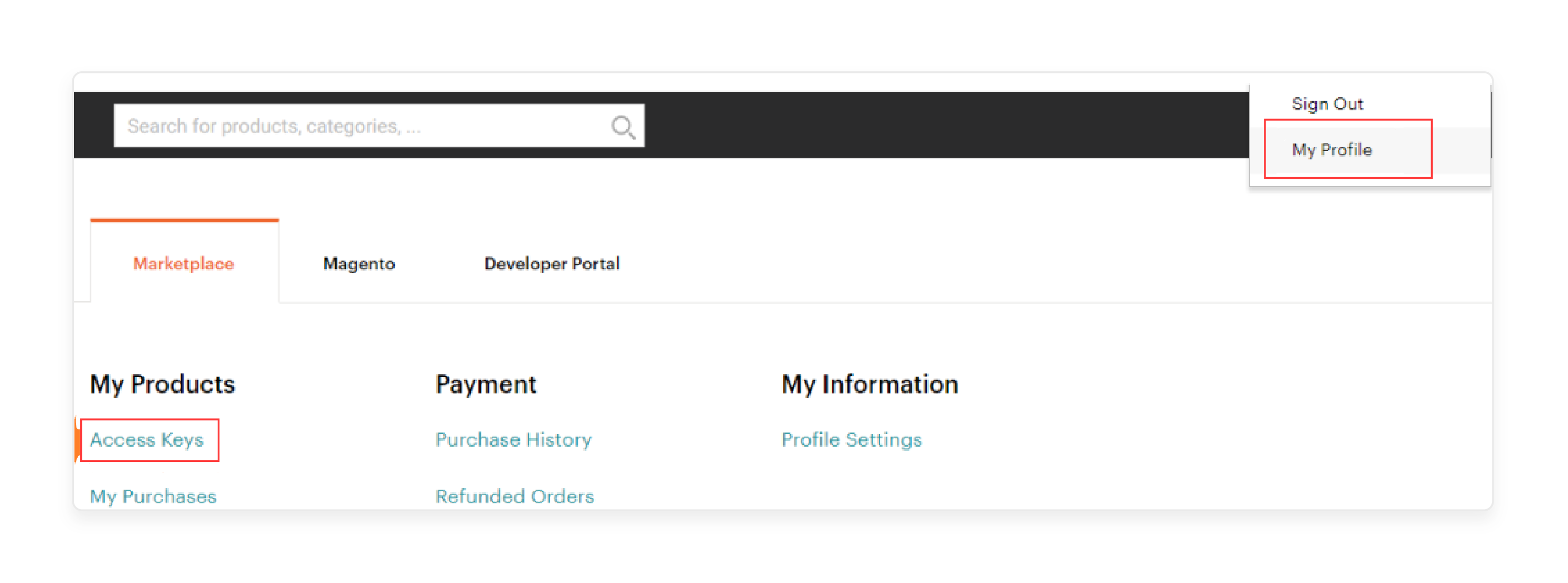
-
Go to My Purchase.
-
Select the Magento 2 multi vendor marketplace extension to install.
-
Click on Technical Details for more info.
Step 2: Update Composer File
-
Go to your Magento multi-vendor project directory.
-
Update the
composer.jsonfile.
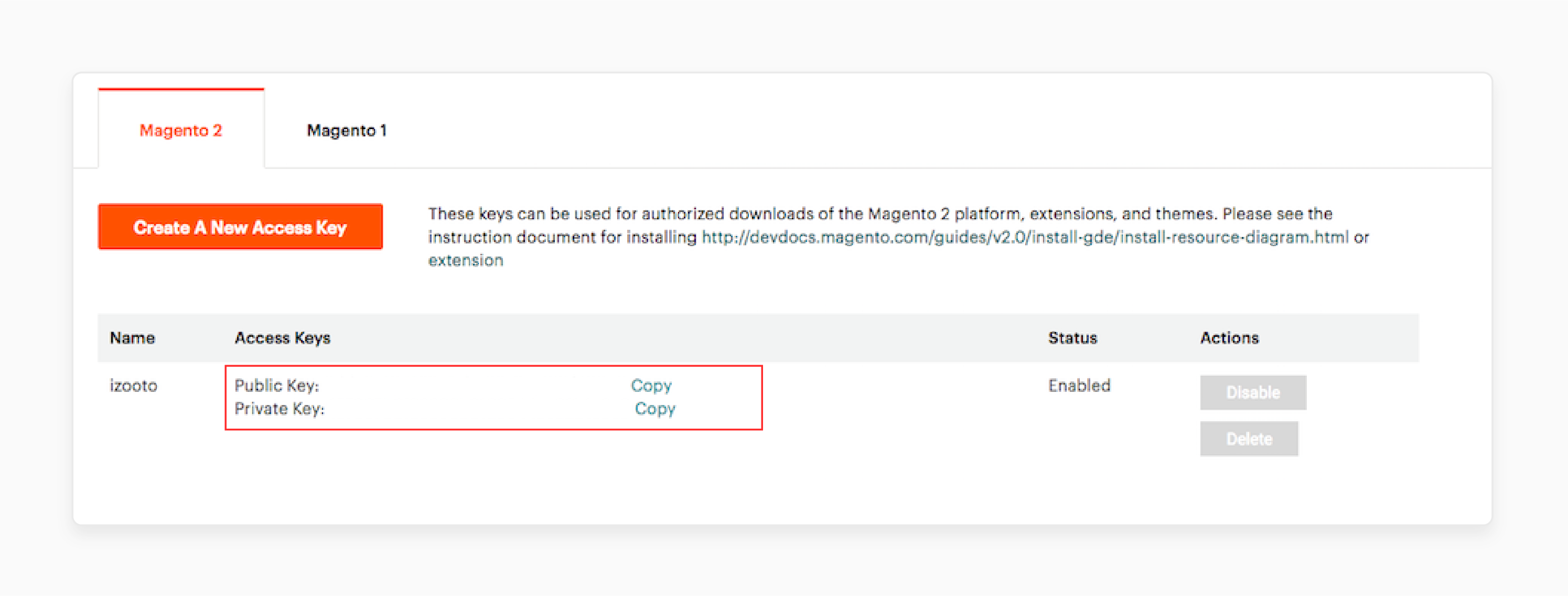
- Use the command:
composer require <component-name>:<version>
Step 3: Upgrade Command

- Run the command to apply the changes:
php bin/magento setup:upgrade
Step 4: Deploy Static Content
- Run the command to deploy static content:
php bin/magento setup:static-content:deploy
Step 5: Clear Cache
- Clear all cache to ensure the extension works smoothly.
3. Install via Admin Web Setup Wizard
Step 1: Go to Component Manager
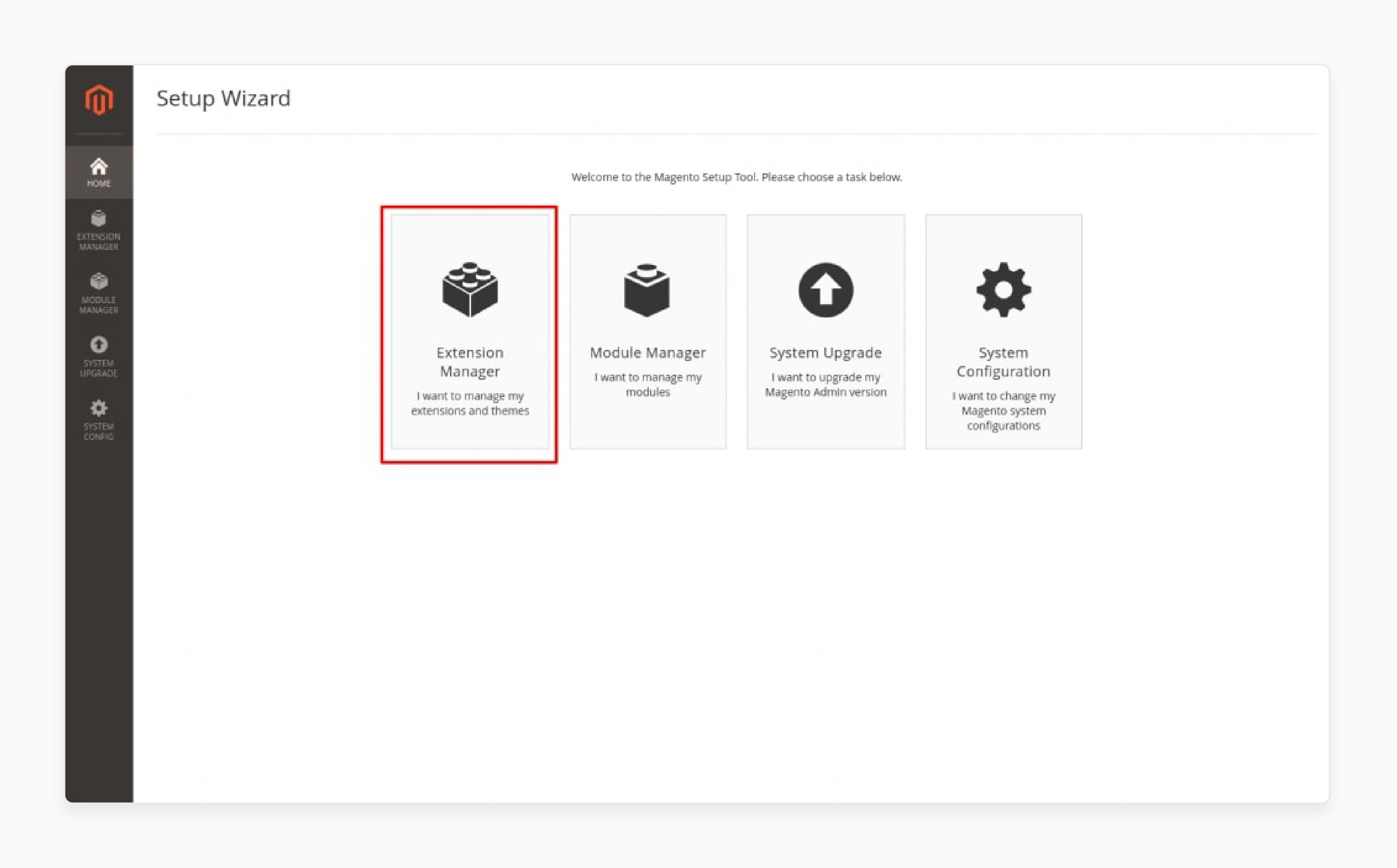
-
Login to Magento 2 Admin Panel.
-
Go to System > Web Setup Wizard > Component Manager.
Step 2: Review and Install
- Click Review and Install to start installing the multi-vendor extension for Magento.
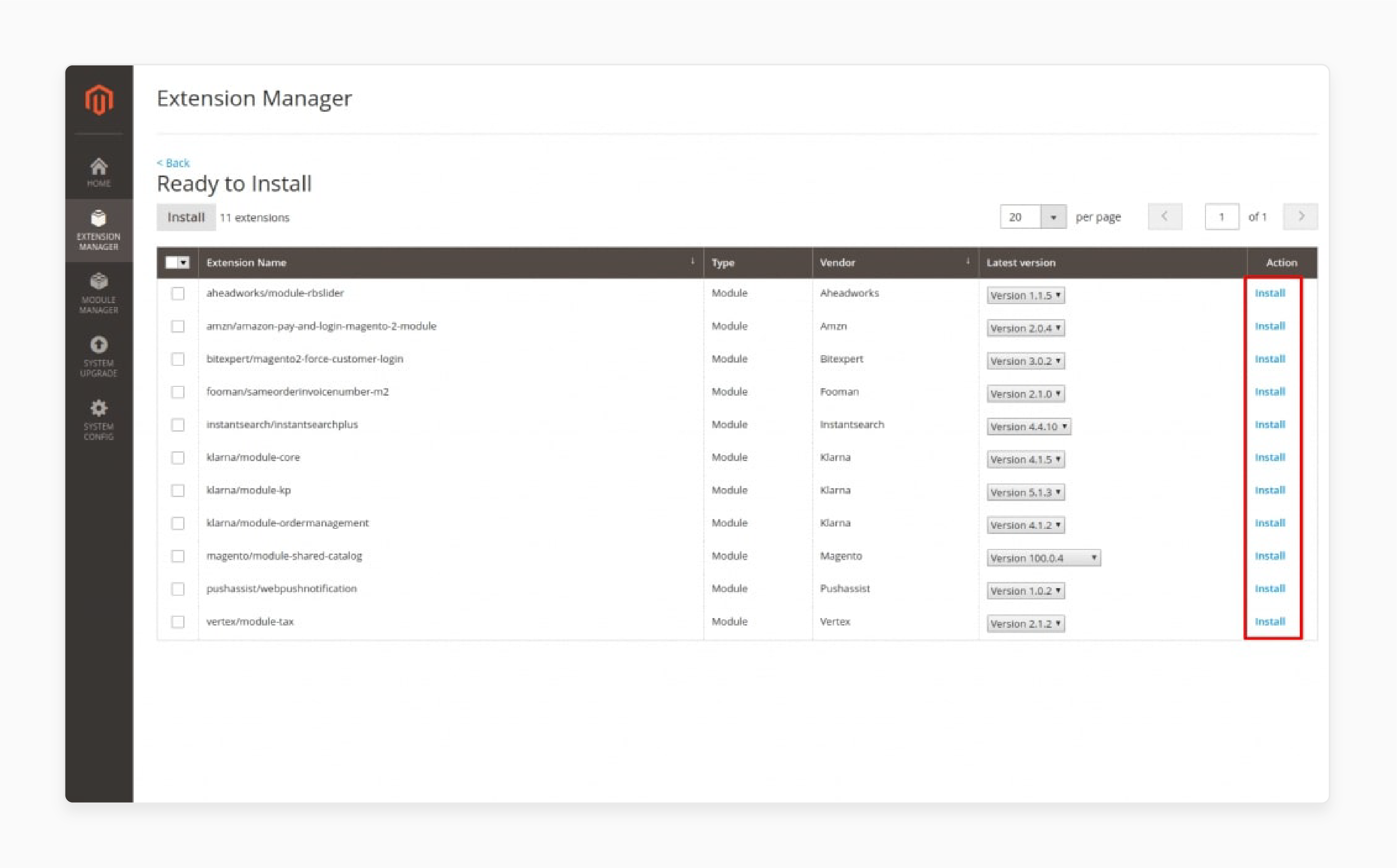
Step 3: Find the Extension
- Find the Magento multi vendor extension in the list and click Install.
Step 4: Execute the Readiness Check
- Run the Readiness Check. If errors appear, such as issues with the Magento cron job, fix them before moving on.
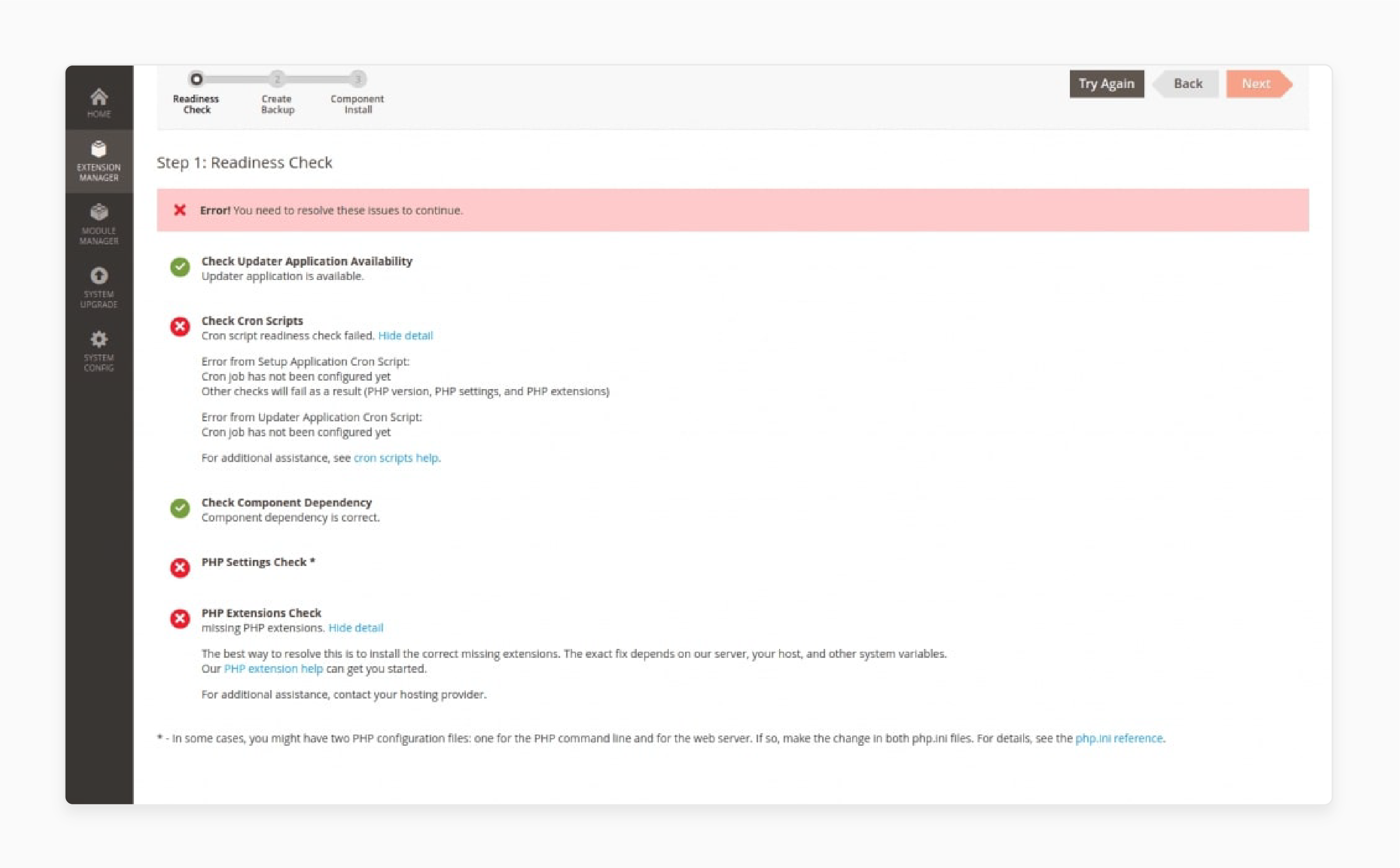
- Once clear, click Next.
Step 5: Create a Backup
-
If needed, create a backup of your ecommerce store to protect your data.
-
Then, click Next.
Step 6: Enable the Extension
- Click Enable to activate the multi-vendor marketplace module.
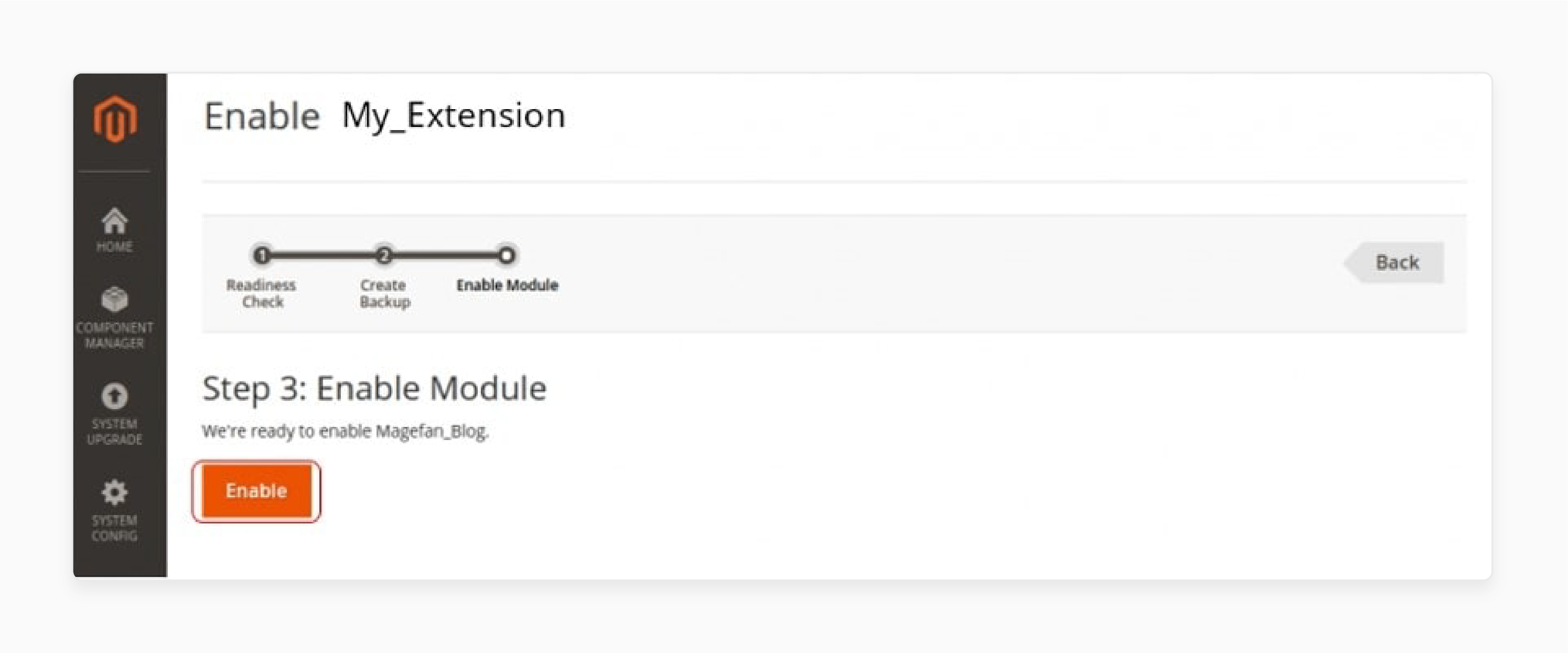
Magento 2 Multi-Vendor Marketplace vs. Other Online Marketplace Solutions
| Feature | Magento 2 Multi-Vendor Marketplace | Shopify Multi-Vendor | BigCommerce Marketplace |
|---|---|---|---|
| Multi-Seller Support | Supports multiple sellers through the marketplace extension for Magento 2. | Requires third-party extensions. | With third-party extensions like Magento MultiVendor. |
| Scalability | Highly scalable, supporting online shopping malls with numerous vendors. | Limited scalability, especially with Shopify. | Limited scalability often needs higher tiers or plugins. |
| Marketplace Setup | Magento 2 converts ecommerce stores into fully active multi-vendor marketplace like Amazon. | Requires extra plugins or custom setup. | Needs plugins for setup may involve more development. |
| Cost | Initial setup costs, but more control over long-term costs. | Higher ongoing fees, especially with plugins. | Higher costs, with ongoing fees for plugins and services. |
| Customization and Flexibility | Full customization for vendor shops with unique Magento SEO- friendly URLs. It controls product and vendor management. | Limited customization depends on plugins. | Limited customization, needs plugins or custom work. |
Top 5 Magento 2 Multi-Vendor Marketplace Extensions
1. Magento 2 Marketplace Basic Extension by LandofCoder
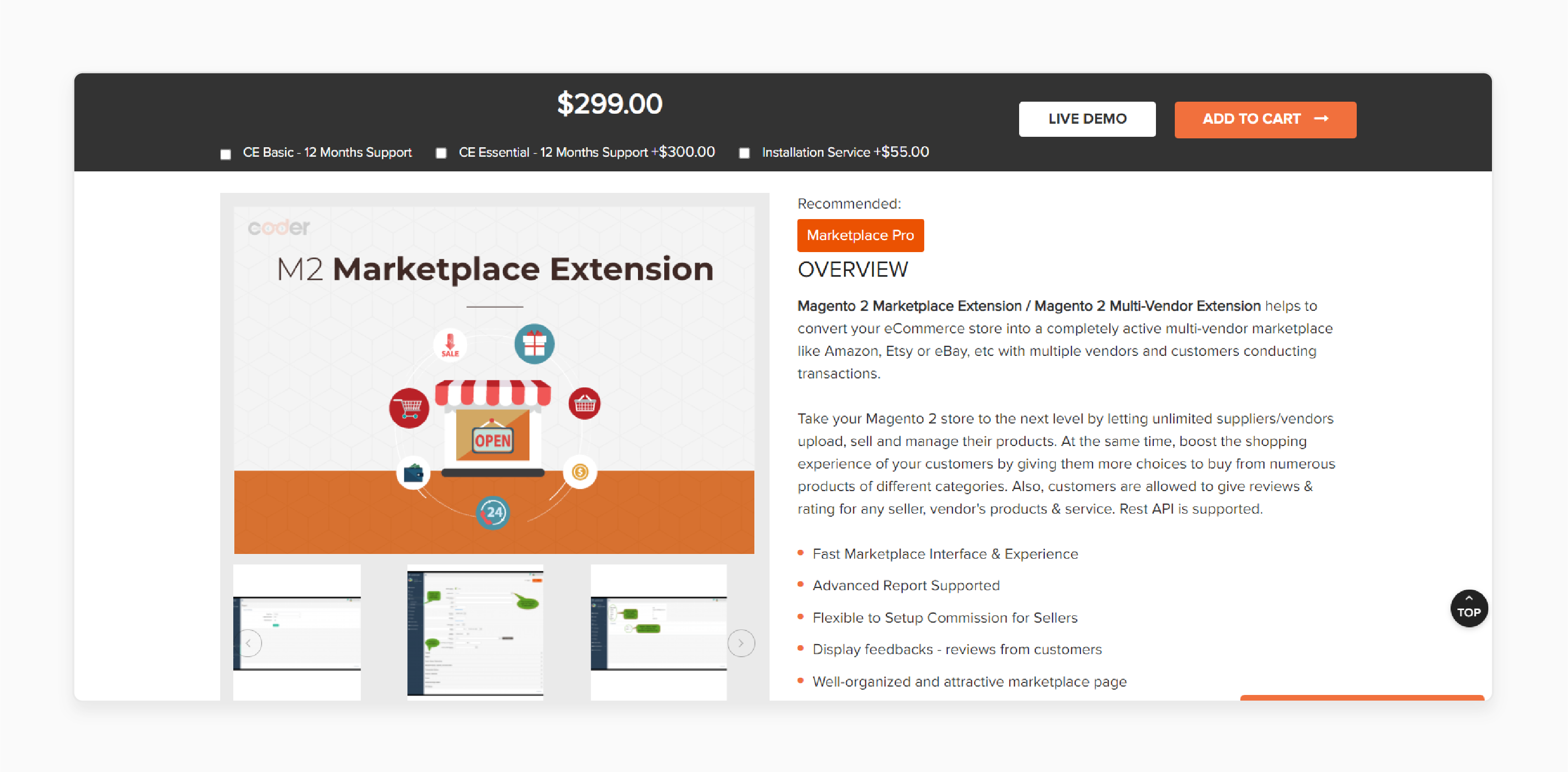
The LandofCoder Magento 2 Marketplace Basic Extension is an affordable option. It allows vendors to bulk upload products from multiple categories. The extension sets Magento's custom shipping methods.
Features:
-
Product approval workflows.
-
Bulk product upload via CSV.
-
Vendor-specific shipping methods.
Price: $299
Compatibility: Community Edition- 2.3.x, 2.4.x.
2. Marketplace Multi Vendor Module for Magento 2 by Webkul
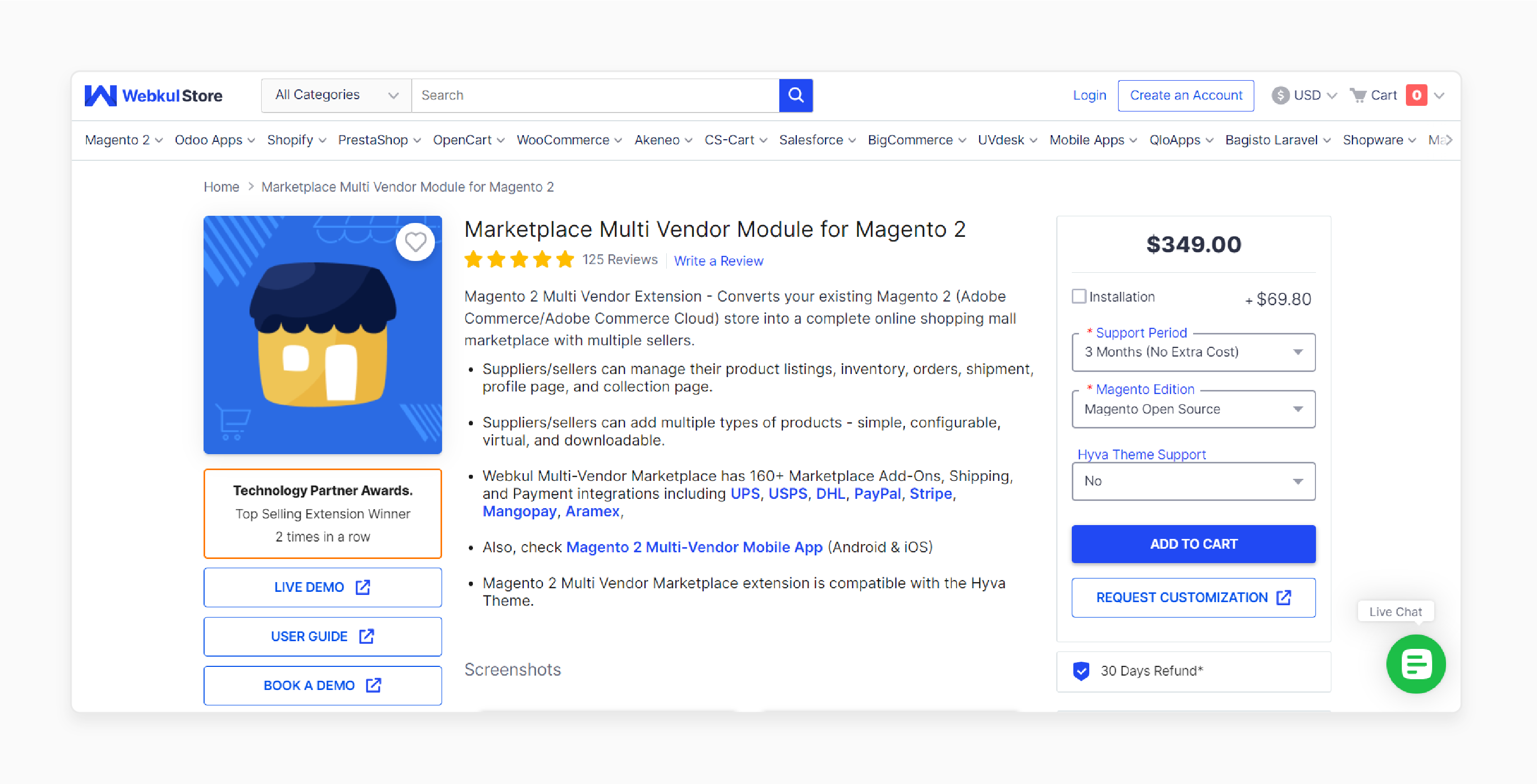
The Webkul Marketplace Multi Vendor Module for Magento 2 turns the store into a multivendor marketplace. Vendors get a dashboard for managing orders, earnings, and products. It provides services with built-in marketplace SMS notifications.
Features:
-
Vendor Magento dashboard for earnings and orders.
-
Built-in Marketplace SMS notifications.
-
Advanced review and rating system.
Price:
| Edition/Time | 3 Months | 6 Months | 1 Year |
|---|---|---|---|
| Magento Open Source | $349 | $488.60 | $523.50 |
| Adobe Commerce (on-premise & cloud) | $698 | $977.20 | $1,047 |
Compatibility: Magento/Adobe Commerce/Adobe Commerce Cloud 2.4.x
3. Magento 2 Multi Vendor Marketplace by MageTop
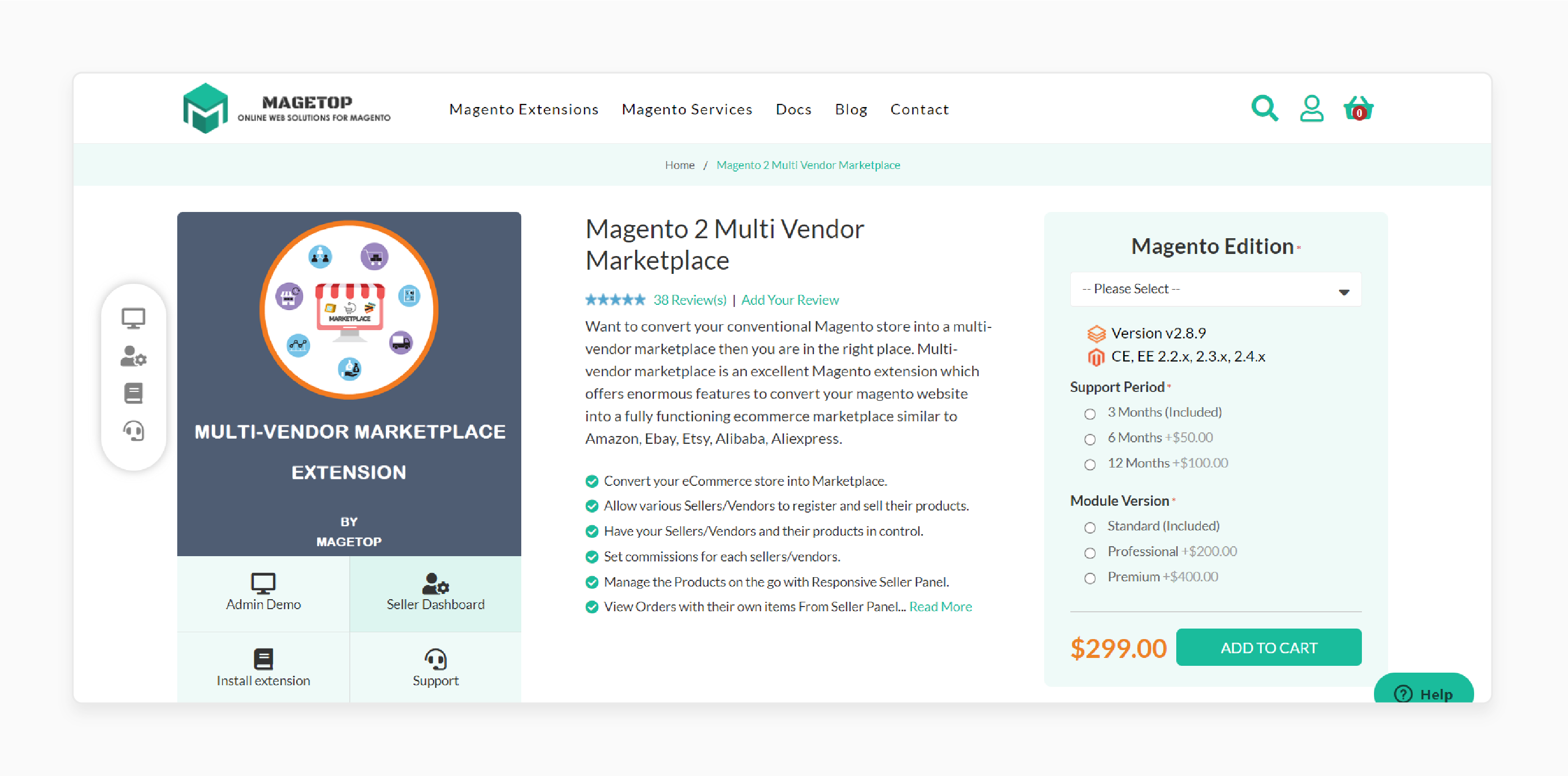
The MageTop Magento 2 Multi Vendor Marketplace Extension is budget-friendly. It includes vendor-specific payment methods and customizable profile pages. The extension helps you build a store into a thriving multivendor marketplace.
Features:
-
Vendor-specific payment methods (e.g., PayPal and Stripe).
-
Customizable vendor profile pages.
-
Marketplace-wide analytics.
Price:
- For Magento Community
| Version/Time | 3 Months | 6 Months | 1 Year |
|---|---|---|---|
| Standard | $299 | $349 | $399 |
| Professional | $499 | $549 | $599 |
| Premium | $699 | $749 | $799 |
- For Magento Enterprise
| Version/Time | 3 Months | 6 Months | 1 Year |
|---|---|---|---|
| Standard | $398 | $448 | $498 |
| Professional | $598 | $648 | $698 |
| Premium | $798 | $848 | $898 |
Compatibility: Magento 2.3.x to 2.4.4.
4. Marketplace Extension by CedCommerce

The CedCommerce Magento 2 Marketplace Extension helps convert the store into a marketplace. It offers real-time notifications for orders and earnings and automates vendor payouts.
Features:
-
Real-time notifications for orders and earnings.
-
Vendor commission management.
-
Automated vendor payouts.
Price:
-
Basic: $60
-
Platinum: $299
-
Advance: $1600
Compatibility: Magento 2.3.x to 2.4.2.
5. Magento Multi Vendor Marketplace Extension by Magebay
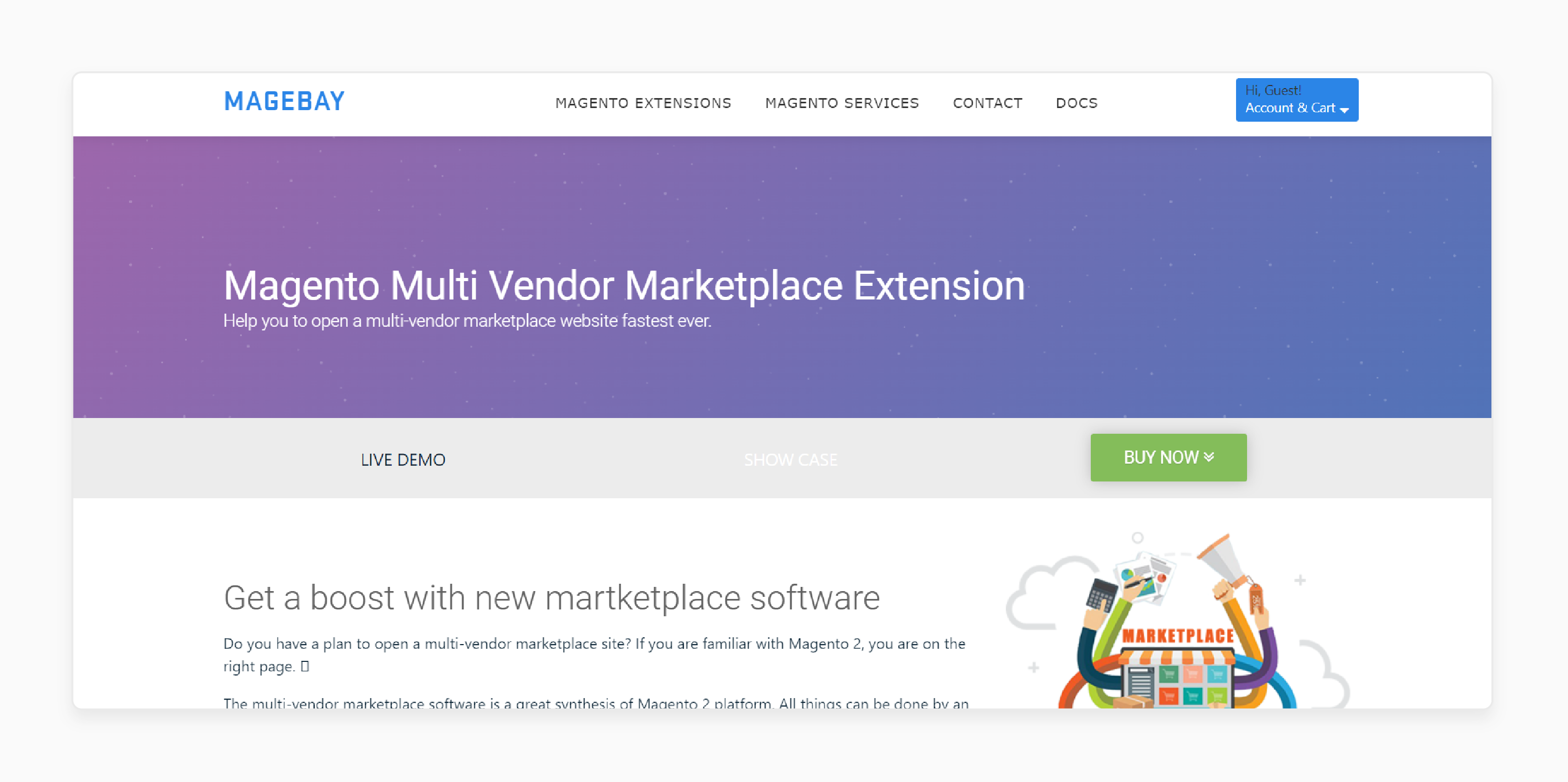
The Magebay Magento Multi Vendor Marketplace Extension offers a flexible multi-vendor marketplace solution. Vendors can customize their storefronts with logos and banners. The extension manages Magento discounts and promotes via social media.
Features:
-
Customizable Magento storefronts.
-
Social media integration.
-
Vendor-specific discount management.
Price:
-
Starter: $299
-
Professional: $499
-
Premium: $799
Compatibility: Magento 2.2.x to 2.4.1.
Common Issues and Troubleshooting Magento Marketplace Extension
| Issue | Details |
|---|---|
| Extension Conflicts | Installing a multi vendor extension for Magento may conflict with other modules. It can cause Magento errors or crashes in the store. |
| Order Management Problems | Vendors may struggle to manage orders in the multi-vendor marketplace. Issues include orders not syncing or failed processing. |
| Vendor Dashboard Issues | Vendor dashboards may not load correctly or show wrong data. This affects vendors' ability to track sales and products. |
| Commission Errors | The marketplace module for Magento 2 may calculate commissions wrong. It can cause payment errors for vendors and customers. |
| Missing Product Listings | Vendor products may not appear after uploading. It can happen due to approval delays or technical issues. |
| Cron Job Failures | Scheduled tasks like emails or Magento reports may fail due to cron job issues. It disrupts automated processes. |
| SEO and URL Problems | Vendors may not have a unique URL for their page, which can hurt their search ranking and visibility. |
| Vendor Permissions Issues | Vendors may not access key features like product or order management. It limits their Magento 2 ecommerce store control. |
| Slow Page Loading | Pages may load slowly when using marketplace extensions with many vendors and products. This leads to a poor user experience. |
| Payment and Shipping Problems | Vendors may face issues with payment or shipping methods not working right. It can cause delays in transactions and deliveries. |
FAQs
1. How does a Marketplace Extension convert your ecommerce store?
The marketplace extension turns your ecommerce store into a completely active marketplace. Using Magento, vendors can sell different types of products in an online shopping experience.
2. Does Magento 2 support B2C and multi-vendor marketplaces?
The Magento 2 multi vendor extension supports both B2C ecommerce and multi-vendor stores. It helps manage vendors, track orders, and offer marketplace offers.
3. What features do marketplace extensions offer vendors?
Marketplace extensions offer Magento URLs for vendor pages, product listings, and tools. It sells different types of products for the customers. Vendors can track Magento sales and manage Adobe ecommerce payments.
4. How do marketplace extensions help with Magento development?
A marketplace extension boosts Magento's local development by adding tools for vendors. It helps convert your ecommerce store into a completely active marketplace.
5. Can Magento 2 handle multiple vendors with unique URLs?
Magento 2 multi-vendor marketplace extensions support unique URLs for vendor pages. Vendors can showcase their products and services on their ecommerce Magento 2 landing pages.
6. What types of products can be sold on a Magento multi-vendor marketplace?
A multi-vendor marketplace supports different types of products. It includes physical goods, digital products, and services. Using Magento 2, vendors can sell across many categories.
7. How do marketplace extensions improve online shopping?
The marketplace extension turns your store into a completely active multi-vendor marketplace. It simplifies online shopping by managing vendors and their products and services.
Summary
Magento 2 Marketplace Extension turns your store into a completely active multi-vendor marketplace. It lets vendors sell products and services in a multi-vendor e-commerce store. Consider the following features of marketplace extension:
-
Multi-Seller Support: Manage multiple vendors and turn your store into a complete marketplace.
-
Payment Processing: Use PayPal and Stripe for payments.
-
Product Management: Bulk upload with Webkul Module.
-
Order Management: Vendors track orders and earnings.
-
Shipping and Fulfillment: Manage shipping with CedCommerce module.
-
Analytics and Reporting: View sales and earnings on Magento.
Explore managed Magento hosting to launch your multi-vendor Magento marketplace.






